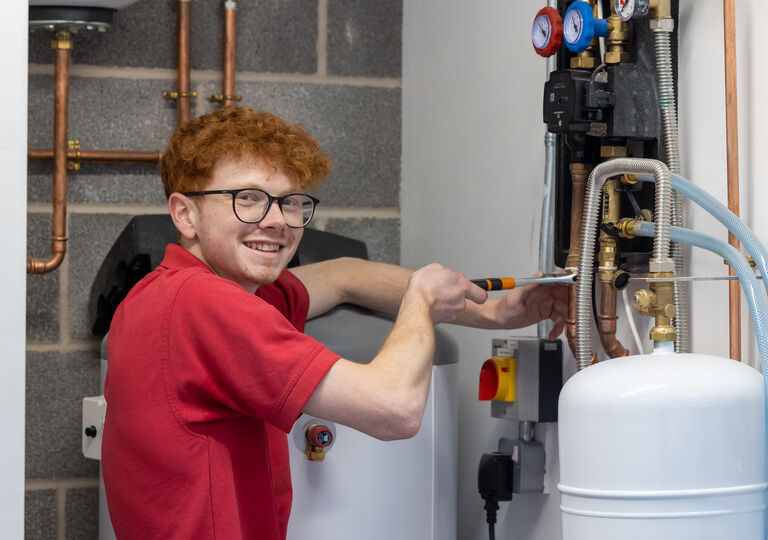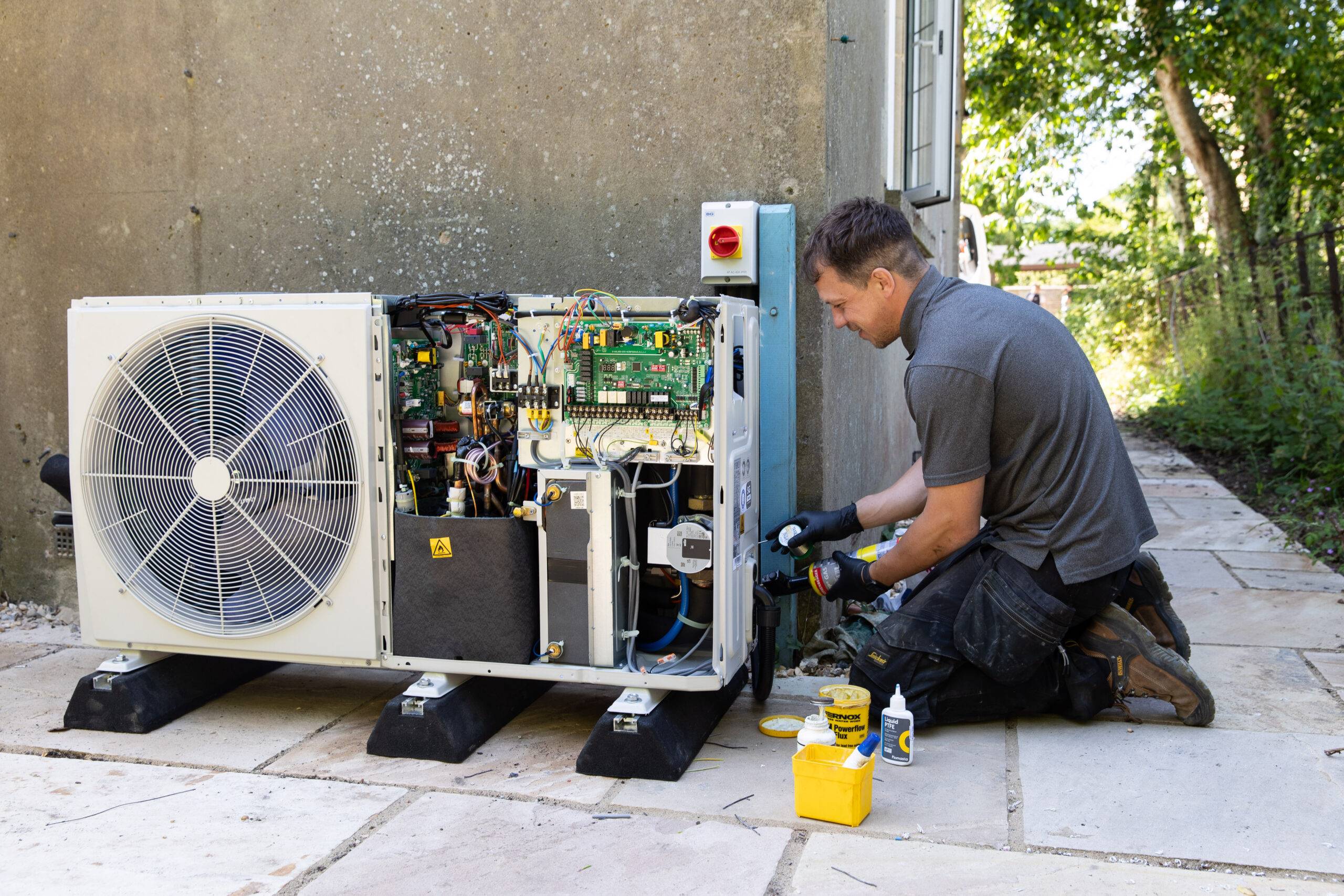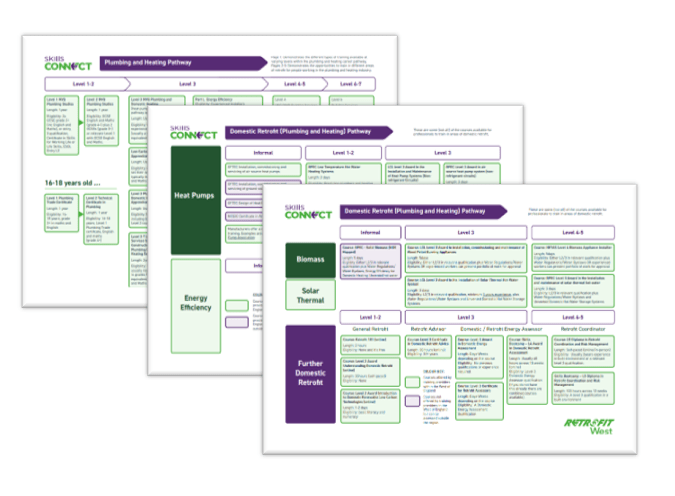Plumbing and heating in domestic retrofit
Guidance on the opportunities in plumbing and heating in the retrofit sector.

Plumbing and heating skills are important to retrofitting domestic buildings. This guide offers information on entry routes into plumbing and heating careers as well information on how experienced professionals in the industry can broaden their career with further training in retrofit.
The demand for retrofit in plumbing and heating
Heating our homes accounts for 14% of the UKs carbon emissions, changing how we heat our homes is one of the most impactful things we can do to reduce climate change. The UK government is gradually phasing out traditional fossil fuel boilers and encouraging homes to switch to low-carbon heating systems such as heat pumps. More than 250,000 homes in the West of England will need to switch to low-carbon heating systems over the coming years.
Developments in low-carbon heating technologies have led to new opportunities in the plumbing industry. Below you’ll find information for new starters looking to enter the industry, as well as how working professionals can train in retrofit.

Entry routes into the industry
Some people apply for a job as a plumber's assistant to gain on-the-job training from working alongside a professional plumber.
Further opportunities: Formalising your work experience with qualifications can both broaden employment prospects and widen further training opportunities. Do discuss any work experience you have with training providers as it may count towards the eligibility for some courses. Some courses are specifically designed for people with prior work experience, for example:
Course: Plumbing and Heating (Experienced Worker Route) Level 2
Eligibility: 4x GCSEs A-C (grades 9-4) and previous experience working within the plumbing industry
Further opportunities: Possible progression to level 3 course or apprenticeship
A variety of course options exist to suit different needs, some offer stepping-stones towards further training, whilst others provide industry-recognised qualifications that support employment. The Chartered Institute of Plumbing and Heating Engineering (CIPHE) offer lots of information on choosing a course, including how different courses impact future employment opportunities. CIPHE indicate a Level 2 qualification with work experience is useful for entering into the industry, and a level 3 qualification (NVQ or Apprenticeship) as the comprehensive training option. Examples of training:
NVQ Level 3 in Plumbing and Domestic Heating
- Length: Usually 3-4 years (sometimes less depending on the course, your previous experience, and qualifications)
- Eligibility: Varies depending on your previous experience and qualifications.
- Further Opportunities: Employment or traineeship in plumbing industry, or expand skillset into retrofitting (see next section: Further Training in Retrofit).
T-level in Building Services Engineering for Construction (Level 3) offers routes to specialise in Plumbing Engineering and Heating Engineering
- Length: 2 years
- Eligibility: 16-19-year-olds, usually requires 4-5 GCSEs at grades 9 to 4 (A* to C) or equivalent, including English and Maths
- Further Opportunities: Higher Education (T-levels earn UCAS points), employment or traineeship, or undertaking an accelerated or higher apprenticeship, or expand skillset into retrofitting (see next section: Further Training in Retrofit). For more information, view the progression profile provided by the Institute for Apprenticeships and Technical Education.
Apprenticeships combine practical training through a paid job alongside formal study. The new Low-Carbon Heating Technician Apprenticeship offers learners the training to directly enter the retrofit industry:
Level 3 Low-Carbon Heating Technician Apprenticeship
- Length: Usually 3-4 years
- Eligibility: Individual employers will set their own entry requirements, but this will typically include English and Maths at GCSE Grade C or above. Apprentices without English or Maths Level 2 must achieve this by the end-point assessment of the course.
- Further Opportunities: Employment, higher apprenticeship, or expand into further areas of retrofit skills training (see next section on Further Training in Retrofit).
An alternative apprenticeship would be the traditional Plumbing and Heating Technician Apprenticeship which can later be followed with additional retrofit training:
Level 3 Plumbing and Heating Technician Apprenticeship
- Length: Usually 3-4 years
- Eligibility: 5 GCSEs (Grade 4+ including English and Maths) or a Level 2 course and functional skills.
- Further Opportunities: Employment, higher apprenticeship, or expand into further areas of retrofit skills training (see next section on Further Training in Retrofit).
The Institute for Apprenticeships and Technical Education offer a detailed interactive map of different courses in the industry at different levels of study.
Further training in retrofit
Learn to specialise in installing and maintaining Ground Source Heat Pumps or Air Source Heat Pumps. These technologies use heat energy from outside to warm inside, you can learn more about how they work on the Energy Savings Trust website.
If you're a heating engineer, you could receive a discount of up to £500 towards the cost of heat pump training through the Heat Training Grant. Training options differ in length and formality, some examples include:
LCL (Level 3) Award in the Installation and Maintenance of Heat Pump Systems
- Length: 3 days
- Eligibility: L2/3 in relevant qualification plus WRAS Water Regulations/Water Byelaws
Skills Bootcamp in Environmental Technologies (e.g. heat pumps)
- Length: Varies (usually 60 hours spread over several weeks)
- Eligibility: 19+ years old and free. You can view latest Skills Bootcamps in the Skills Connect directory.
The Heat Pump Association provide a list of manufacturers that offer formal and informal training, for example:
Introduction to Heat Pumps (online)
- Length: 1.5hours
- Eligibility: Intended for experienced Gas appliance-based installers
View a range of training providers in the West of England offering heat pump training in the Skills Connect Directory.
Specialise in the installation of Solar Thermal Hot Water Systems that store water warmed by the sun’s energy. To learn more about low-carbon heating system visit the Energy Savings Trust. Training options differ in length and formality, here is an example of training is:
Level 3 Award in the Installation of Solar Thermal Hot Water System
- Length: 3 days
- Eligibility: Details on BPEC (awarding body) website
View a range of training providers in the West of England offering Solar Thermal training in the Skills Connect Directory.
Specialise in how to install Biomass systems which produce energy from burning wood, plants and other organic matter, such as manure or household waste. More information on visit the Energy Savings Trust. Examples of training:
Level 3 Award in the installation, commissioning and maintenance of Wood Pellet Burning Appliances
- Length: 5days
- Eligibility: Details on the HETAS (awarding body) website
View a range of training providers in the West of England offering biomass training in the Skills Connect Directory.
There are a variety of courses designed to teach the basics principles of retrofit. These types of courses are useful for lots of can help to identify areas of interest. Some examples are:
Informal Training: Retrofit 101 (online)
- Length: 2 hours
- Eligibility: None and it’s free
Formal Training: Level 2 Award Understanding Domestic Retrofit (online)
- Length: 30hours (self-paced)
- Eligibility: None
New job roles have been developed to support the retrofitting process, along with specific training requirements. Note many of these courses are partially or fully funded. Below are the job roles and examples of relevant training:
Retrofit Assessor Role
Completing property surveys to improve energy efficiency.
- Training: Skills Bootcamp - Level 4 Award in Domestic Retrofit Assessment
- Length: Usually 60 hours across 10 weeks (online)
- Eligibility: Level 3 Domestic Energy Assessor qualification (if you do not have this already there are combined courses available).
Retrofit Advisor Role
Providing independent advice to residents on how to retrofit their home.
- Training: Level 3 Certificate in Domestic Retrofit Advice
- Length: 30 hours (online)
- Eligibility: 18+ years
Retrofit Coordinator Role
Retrofit Coordinators manage retrofit projects including procurement, specification, and delivery.
- Training: Skills Bootcamp - Level 5 Diploma in Retrofit Coordination and Risk Management
- Length: 103 hours across 13 weeks
- Eligibility: A level 3 qualification in a built environment
View a range of training providers offering retrofit training in all these areas and more in the Skills Connect Directory.
Job profiles
- Median Advertised Salary £38K
- 140 job postings in the region in 2023
- Specialised Skills: Plumbing, Heating Systems, Heat Recovery Ventilation, Renewable Energy
- Soft Skills: Communication, Customer service, Detail-oriented, Problem-solving
- Heat Pump Engineers can set up a business, work for themselves or be employed by a company.
- For more information about the role of a Heat Pump Engineer visit Career Pilot
- Median Advertised Salary £34K
- 484 job postings in the region 2023
- Specialised skills: Plumbing, Carpentry, Construction, Tiling repairs, Pipefitting
- Soft Skills: Communication, Customer service, Detail-oriented, Problem-solving, Self-motivated
- Plumbers can set up a business, work for themselves or be employed by a company.
- For more information about the role of a Plumber visit Career Pilot
Finding Support
Professional organisations offer industry specific support, such as career advice, training, membership schemes, networking opportunities, as well as support with industry regulations or developments. Here are some organisations relating to the Plumbing, Heating and Retrofit industry:
RetrofitWest are the local service set up to support the development and growth of the retrofit market in the West of England. They offer advice and guidance, events, networking, fully and partially funded courses, as well as a directory of local retrofit professionals to link customers and suppliers together.
Chartered Institute for Plumbing and Heating Engineering offer lots of industry related careers information and advice.
MCS Foundation sets, defines and maintains the Standards for low-carbon energy technology products, contractors and their installations. This includes heat pumps, solar, biomass, small wind and battery storage. They list the skills courses
Heat Pump Association is the UK’s leading authority on the use and benefits of heat pump technology and includes many of the country’s leading manufacturers of heat pumps, components and associated equipment. There website includes a section on training associated with their member manufacturing organisations.
The Association for Renewable Energy and Clean Technology is a not-for-profit trade association providing the latest information on policy updates, sector-specific insights, topical briefings and industry-leading training/events.The Association for Renewable Energy and Clean Technology
Chartered Institution of Building Services Engineers promotes the careers of building services engineers by accrediting courses of study in further and higher education, by approving work-based training programmes and providing routes to full professional Registration and Membership.
The Institute for Apprenticeships and Technical Education offer a detailed interactive map of courses at different levels of study.
The Construction Industry Training Board (CITB) detail courses and qualifications and fund Go Construct which offers lots of careers advice on working in the built environment.
Training Grants
The Government's Heat Training Grants offer up to £500 towards the cost of heat pump training.
Explore further pathways into domestic retrofit
Explore some of the other career pathways in domestic retrofit, for new starters or experienced professionals looking to train up.
Plumbing Pathway Maps
Email us to request a copy of our pathway maps, which outline the various retrofit courses and qualifications in plumbing, from entry-level to progression routes.


Talk to a friendly advisor
Feeling overwhelmed or not sure where to start? We’re more than a website, we have real people waiting to help with all your skills, training and career needs.